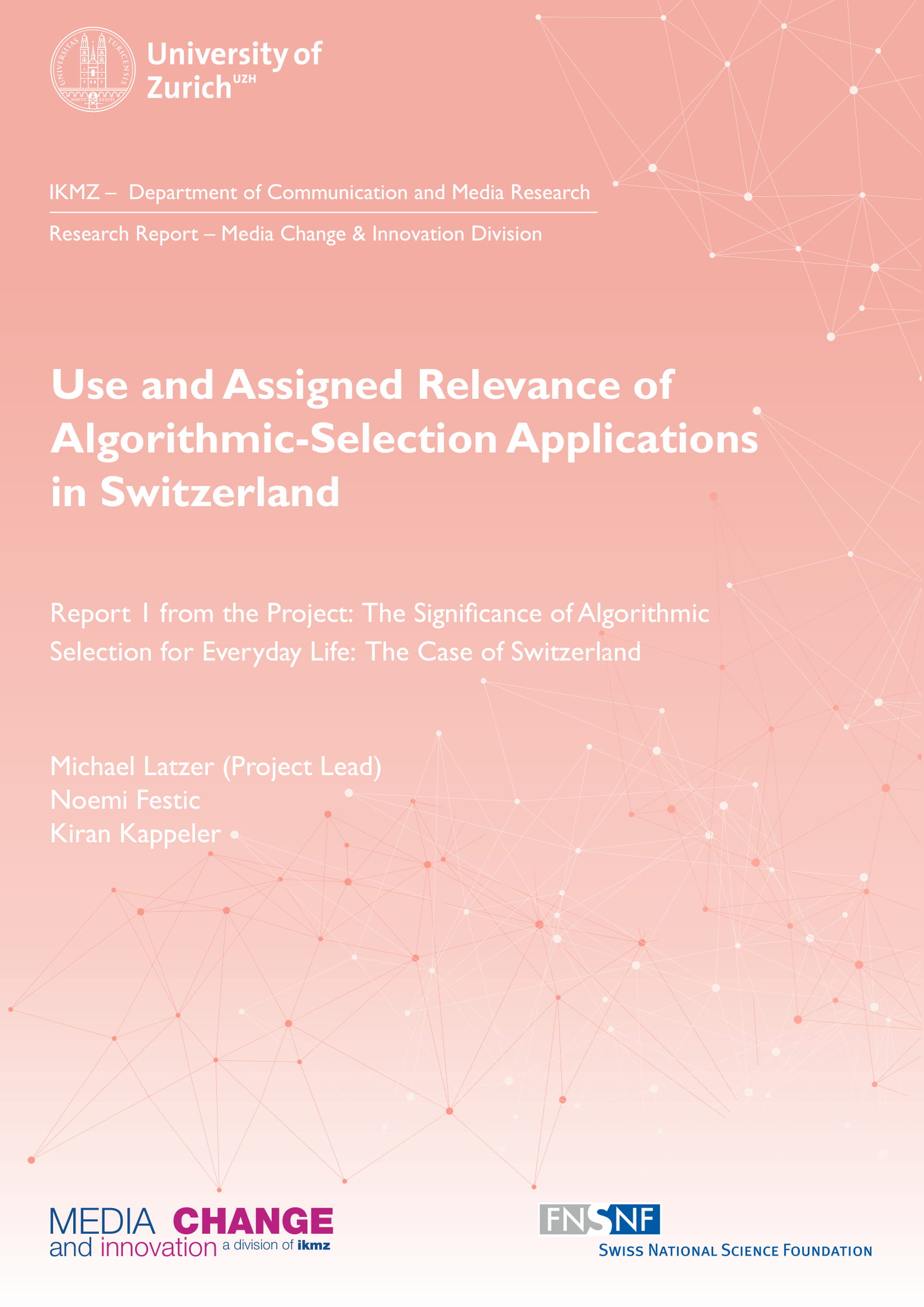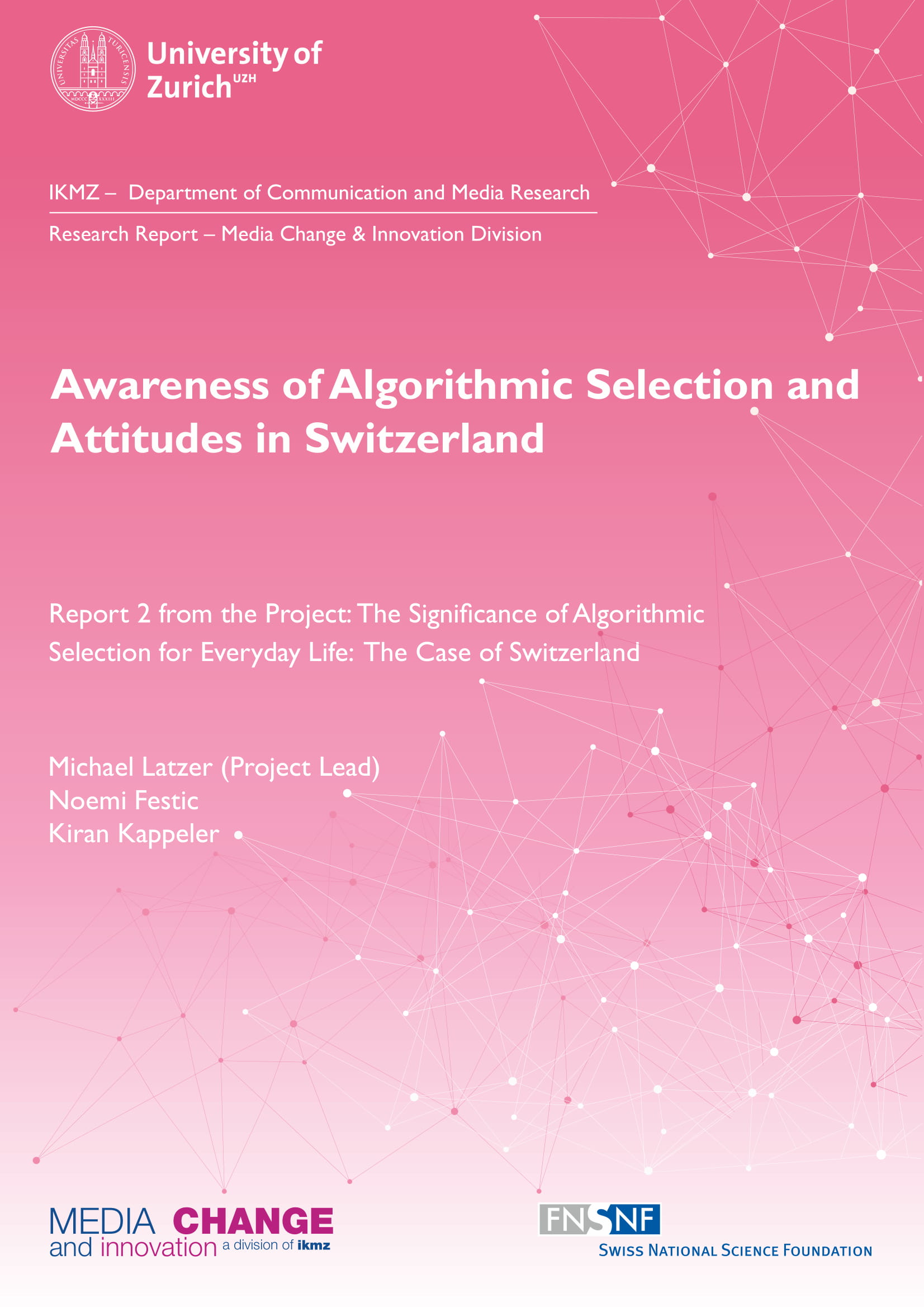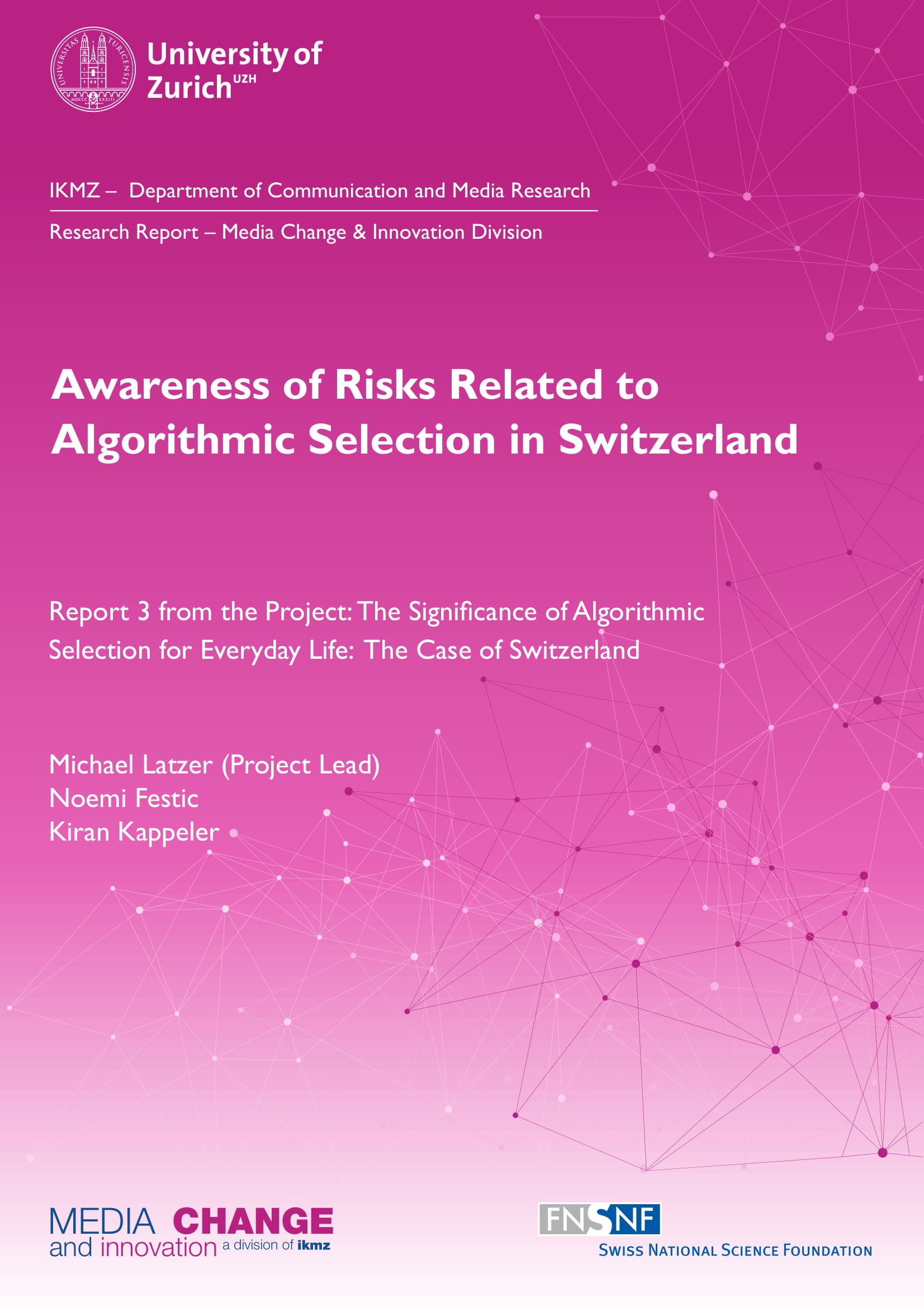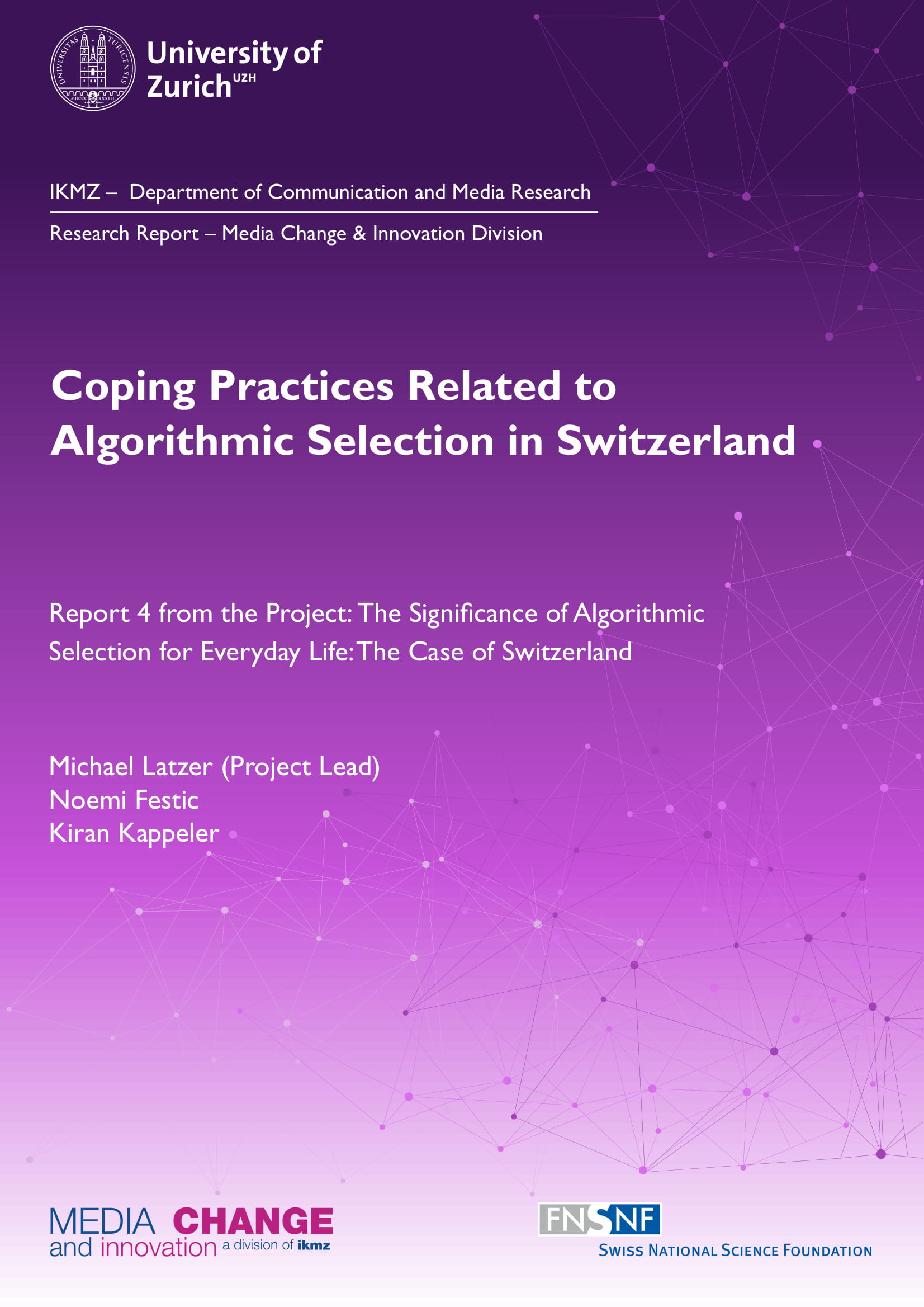The Significance of Algorithmic Selection for Everyday Life: The Case of Switzerland
This project empirically investigates the significance of automated algorithmic selection (AS) applications on the Internet for everyday life in Switzerland. It is the first countrywide, representative empirical study in the emerging interdisciplinary field of critical algorithm studies which assesses growing social, economic and political implications of algorithms in various life domains. The project is based on an innovative mix of methods comprising qualitative interviews and a representative Swiss online survey, combined with a passive metering (tracking) of Internet use.
What do algorithms do online? Watch our short introductory video to learn more about algorithmic decision making (in German).
Research Reports (Survey)
- Latzer, Michael / Festic, Noemi / Kappeler, Kiran (2020): Use and Assigned Relevance of Algorithmic-Selection Applications in Switzerland. Report 1 from the Project: The Significance of Algorithmic Selection for Everyday Life: The Case of Switzerland. Zurich: University of Zurich. http://mediachange.ch/research/algosig
- Latzer, Michael / Festic, Noemi / Kappeler, Kiran (2020): Awareness of Algorithmic Selection and Attitudes in Switzerland. Report 2 from the Project: The Significance of Algorithmic Selection for Everyday Life: The Case of Switzerland. Zurich: University of Zurich. http://mediachange.ch/research/algosig
- Latzer, Michael / Festic, Noemi / Kappeler, Kiran (2020): Awareness of Risks Related to Algorithmic Selection in Switzerland. Report 3 from the Project: The Significance of Algorithmic Selection for Everyday Life: The Case of Switzerland. Zurich: University of Zurich. http://mediachange.ch/research/algosig
- Latzer, Michael / Festic, Noemi / Kappeler, Kiran (2020): Coping Practices Related to Algorithmic Selection in Switzerland. Report 4 from the Project: The Significance of Algorithmic Selection for Everyday Life: The Case of Switzerland. Zurich: University of Zurich. http://mediachange.ch/research/algosig
News
Infographics
- How Switzerland uses algorithmic online services (English / German)
- How Switzerland uses algorithms to stay fit (English / German)
- What Switzerland knows about algorithms (English / German)
- How the Swiss are losing control of the algorithms (English / German)
- What the Swiss think about risks of algorithms and how they deal with them (English / German)
- Who in Switzerland is most vulnerable to risks of algorithms (English / German)
- What Switzerland thinks about the internet (English / German)
Selected Figures for Download
About the Project
In digital societies marked by growing datafication, Internet-based applications that build on AS are already deeply embedded in everyday life. These automatic assignments of relevance to selected pieces of information are indispensable for extracting social and economic value from big and small data. Accordingly, applications operating on AS are constitutive for daily online routines such as search, recommendation, filtering, and scoring. Thereby, they are shaping how the world is perceived, how realities are constructed, and how people behave.
Multidisciplinary research on algorithms focusing on opportunities, social risks, ethical challenges or governance has so far predominantly been theoretical, without drawing on comprehensive empirical evidence. Studies that empirically show the extent to which AS applications are relied upon and what (subjective) significance they hold in everyday life are largely absent or limited to a specific application or service.
This project aims to fill this research gap by investigating the significance of AS applications in five central domains of everyday life: social and political orientation, entertainment, commercial transactions, socializing, and health. A functional typology of AS applications and a classification of its associated risks, which resulted from our earlier research, serve as a starting point. By applying an innovative mixed-methods approach – comprising qualitative interviews and a representative Swiss online survey, combined with a passive metering (tracking) of Internet use (on mobile devices and desktop/laptop computers) – the project investigates the relative importance of AS applications and assesses individuals’ use and attitudes towards AS applications and its implications.
Beside detailed empirical insights into the significance of Internet-based AS applications in each domain, this comprehensive approach permits comparisons between socially differentiated uses (digital inequalities) and implications of AS in the five central domains of everyday life. Thereby, the project provides the empirical basis to weight the hitherto theoretically derived implications of AS and an informative basis for evidence-based public policies and governance choices.
The project is supported by the Swiss National Science Foundation.
MCI-Publications on Algorithmic Selection for Download
- Latzer, Michael (2021): Digital Trinity – Controllable Evolution – Everyday Religion. Characteristics of the Socio-Technical Transformation of Digitalization. Working Paper – Media Change & Innovation Division. University Zurich, Zurich. [pdf]
- Latzer, Michael (2021): Digitale Dreifaltigkeit – kontrollierbare Evolution – Alltagsreligion. Kennzeichen des soziotechnischen Transformationsprozesses der Digitalisierung. Working Paper – Media Change & Innovation Division. University Zurich, Zurich. [pdf]
- Festic, Noemi / Büchi, Moritz / Latzer, Michael (2021): How Long and What For? Tracking a Nationally Representative Sample to Quantify Internet Use. Journal of Quantitative Description, 1, 1-23. https://doi.org/10.51685/jqd.2021.018 [more] [pdf]
- Latzer, Michael / Just, Natascha (2020): Governance by and of algorithms on the internet: impact and consequences. In Oxford Research Encyclopedia of Communication. Oxford University Press. doi: 10.1093/acrefore/9780190228613.013.904 [more] [pdf]
- Festic, Noemi (2020): Same, same, but different! Qualitative Evidence on how Algorithmic Selection Applications Govern Different Life Domains. In: Regulation & Governance [forthcoming]
- Latzer, Michael / Festic, Noemi (2019): A Guideline for Understanding and Measuring Algorithmic Governance in Everyday Life. In: Internet Policy Review, 8(2). doi: 10.14763/2019.2.1415 [pdf]
- Just, Natascha / Latzer, Michael (2018): Algorithmic Selection on the Internet. In: Warf, Barney (ed.). The SAGE Encyclopedia of the Internet. Sage: Thousand Oaks, 12–14. doi: http://dx.doi.org/10.4135/9781473960367.n10
- Saurwein, Florian / Just, Natascha / Latzer, Michael (2017): Algorithmische Selektion im Internet: Risiken und Governance automatisierter Auswahlprozesse. In: kommunikation@gesellschaft, Jg. 18. [pdf]
- Just, Natascha / Latzer, Michael (2016): Governance by Algorithms: Reality Construction by Algorithmic Selection on the Internet. In: Media, Culture & Society, Published online before print April 21, 2016, doi: 10.1177/0163443716643157. [more] [pdf]
- Latzer, Michael / Hollnbuchner, Katharina / Just, Natascha / Saurwein, Florian (2016): The economics of algorithmic selection on the Internet. In: Bauer, J. and Latzer, M. (Eds), Handbook on the Economics of the Internet. Cheltenham, Northampton: Edward Elgar, 395-425. [pdf]
- Saurwein, Florian / Just, Natascha / Latzer, Michael (2015): Governance of algorithms: options and limitations. In: info, Vol. 17 (6), 35-49. [pdf]











